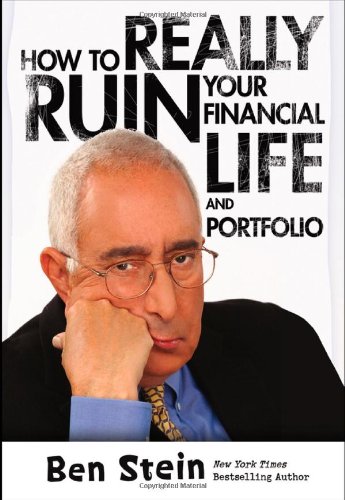Don’t be a Fool
When I wrote for RealMoney, I would often write things critical of others, but not identify my target.? Why?
- I didn’t want to get kicked out, or have a fight that would discredit RealMoney.
- But I did want to teach general principles.
I maintain that practice to this day.? Typically, I don’t name names.? Again, two reasons:
- I don’t want to get sued.
- But I do want my readers to understand what are shoddy practices, so they can avoid them.
Recently, a large investment website has been loosening up their standards for who they will allow to advertise via e-mail.? Here is one redacted advertisement:
A New Strategy With Startling Results
Dear Investor,
A small group of XXX clients are making 20% to 40% in trading profits…PER DAY.
They call it ?Exploiting the Banker?s Market.?
Their trading methodology is unlike anything you?ll find in today?s financial marketplace.
And best of all, their newsletter is totally free.
Honestly, this is the only investing newsletter worth your time.
?Sign up for free now. [link removed for your protection]
Sincerely,
XXX Investing Team
P.S. By exploiting the banker?s market, they just hit winners on 19 out of 22 trades, including gains of 45%, 48%, 56%, and 78%.
Prior to this, they took gains on 30 out of 33 trades. You can achieve these same returns. It’s simple.
As long as the bankers remain in control of the markets (and now that Obama got re-elected, you know they will), this unique trading methodology offers you a safe and consistent way to profit.
If you?re interested in profiting day after day ? even if the bankers and the Fed are working against you ? then do not miss these unique trading strategies.
It?s all revealed to you in this free newsletter. [link removed for your protection]
YYY
30 Forest Ave
Naperville, IL 60540
Note that YYY is a penny stock promoter.? XXX may be decent enough, aside from their willingness to employ YYY.? Investing in options is a ticket to the poor house for most, because the market is not very liquid.? It is very hard to make money trading options.? Most lose money doing so.
But here is another from the same e-mail list:
Dear Investor,
Where were you on August 13, 2012, when tech-stock guru WWW gave the green light on EZchip Semiconductor (EZCH), then trading at $28.36?
Well, maybe it doesn?t matter because very few investors had ever even heard of this red-hot networking chip company.
But on November 8, EZchip reported a huge earnings beat and rallied an incredible 15% to $34.80 in one day, delivering a 23% gain for ZZZ subscribers [link removed for your protection] who bought alongside Sean at the $28 level.
So we?ll ask you some simple questions?
- Do you want to make money off of hot technology trends that have nothing to do with how the US Fiscal Cliff and European drama play out?
- Would you like to get in on the hot storage play at which Facebook (FB) and Apple (AAPL) are throwing money?
- Or the semiconductor producer that is printing money on the global transition to 4G/LTE smartphones?
- How about the left-for-dead social-media play that is about to rise like a phoenix?
If you answered yes, then we’ve got an offer for you.
We?re giving you an exclusive 30% discount on an annual subscription to ZZZ [link removed for your protection] , WWW?s exclusive money-making tech stock newsletter that will help you do all of the above and more.
For just $447 (a savings of nearly $200!), you?ll receive:
? ? ? ? ? ? ? ? Exclusive access to WWW?s hand-picked portfolio of technology stocks ? ? ? ? ? ? ? ? ? Instant e-mail updates whenever WWW makes a trade or initiates new coverage ? ? ? ? ? ? ? ? ? Expert analysis of the most important tech-industry news ? ? ? ? ? ? ? ? ? Access to quarterly webcasts, where WWW delivers in-depth analysis of the technology industry ? ? ? ? ? ? ? ? ? WWW?s special report: 5 Stocks That Will Gain 50% From Apple TV ? ? ? ? ? ? But most importantly, with a ZZZ subscription, you will get direct access to Sean, who stands by ready to answer any and all reader questions through our regular mailbag feature.
Sean?s goal is simple: to have your ZZZ subscription pay for itself many times over through winning trades while keeping you up to date on everything that?s hot in tech.
So, do you want in? [link removed for your protection]
Advertisements like this appeal to dopes.? There is no easy money in the market.? Anyone can cherry-pick a record of risky calls and show a bunch of wins.? What of the losses? How many and how severe were they?? Why don’t you show the results of an audited real money portfolio that you managed?? What, you didn’t put any real money behind? these calls?
Look, when advertised results are too high, they usually aren’t real.? Get smart.? Avoid websites that propagate such nonsense.? Anyone willing to sully their reputation for a bunch of cheap advertising revenues is not worth your time.? I get about 10 advertising proposals per week, and I turn almost all of them down.
If it seems too good to be true, it is false.? Avoid reaching for the rare exception, and you will be much better off.




